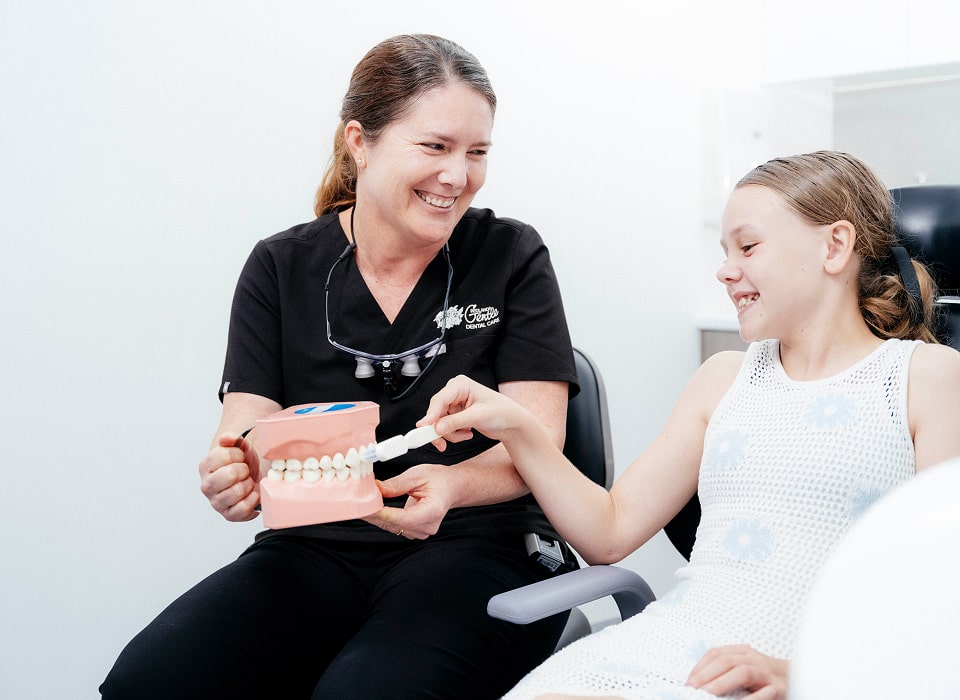Gentle and Effective Root Canal Treatment to Restore Your Smile and
Ease Discomfort
Why Choose Us
Choose Redlands Gentle Dental Care for Trusted and Quality Dental Care Services
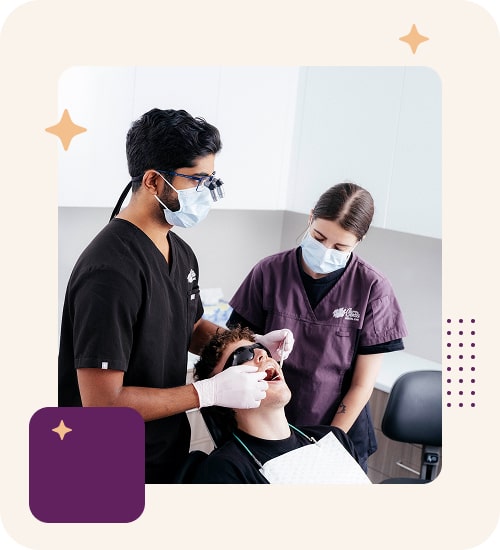
Experience Gentle, Personalised Dental Care
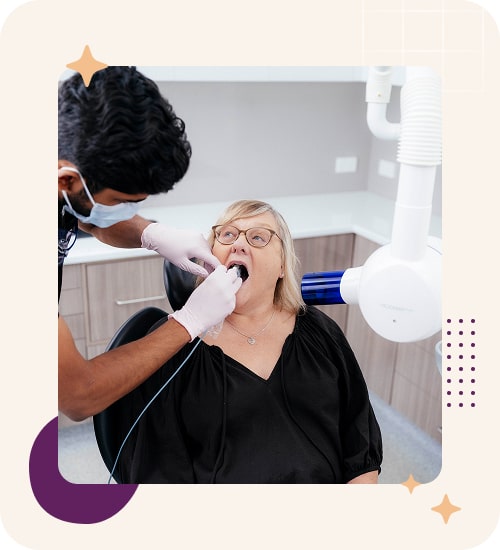
Meet Our Experienced and Empathetic Team
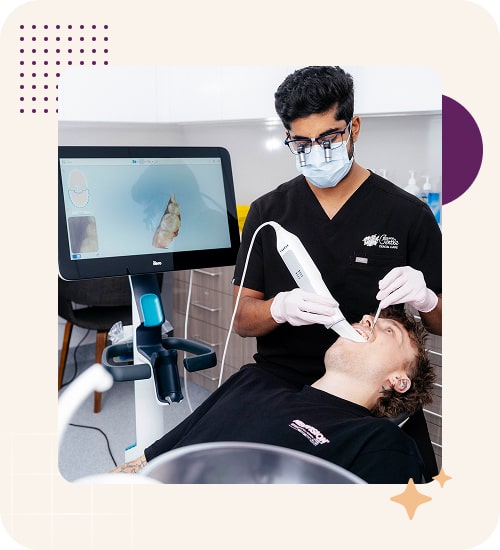
Enjoy Comprehensive Dental Services Under One Roof

Feel at Home in Our Family-Friendly Atmosphere

Benefit from Affordable and Transparent Pricing

Trusted Community Pillar with 40 Years of History
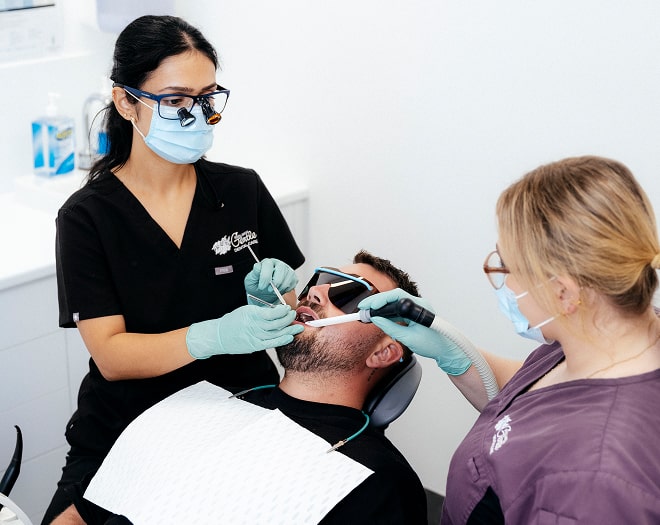
Discover Lasting Comfort and Protection
Through Our
Root Canal Procedure
Are You a Candidate for Effective and Comfortable Root Canal Treatment?
Not everyone needs a tooth root canal treatment, but certain symptoms and conditions indicate when it may be necessary. Below are key criteria that can help determine if this endodontic treatment is suitable for your dental needs:
- You experience prolonged and severe pain or sensitivity due to damaged or infected pulp or deep decay in a tooth.
- Your tooth has become darkened or discoloured, suggesting internal damage or infection that requires treatment to restore health and function.
- You notice a persistent pimple-like bump on your gums, which may drain pus, indicating an infection spreading from the root of the tooth.
- You want to prevent infection from spreading to the surrounding bone or affecting other teeth in your mouth significantly and maintain overall dental health.


The Benefits of Root Canal Therapy to
Your Smile
Root canal treatment offers a practical and effective way to address tooth pulp infection, alleviate pain, and improve overall dental health. Below are the specific benefits that make this procedure a preferred option for restoring a tooth:
- The procedure removes infected pulp tissue and seals the root canal system using biocompatible materials, addressing the infection at its source.
- It alleviates pain caused by pulp infection or inflammation while restoring your tooth’s functionality, allowing you to bite, chew, and speak with ease.
- By preserving the tooth’s natural structure, the treatment helps maintain a balanced bite, improving comfort and overall outcomes for patients.
- Root canal therapy helps prevent the need for more complex treatments by addressing issues early, reducing the risk of tooth loss or further damage.

Experience the Difference of Gentle Care with Us
How We Can Help
Learn How Dental Crowns Can Address Your Dental Problem
I Have a Dental Emergency
Our Payment Options
Find What Works for Your Financial Needs With Our Dental Payment Options
Child Dental Benefits Schedule
Invest in your child's smile with the Child Dental Benefits Schedule (CDBS). This government program offers eligible families financial support for essential dental services, promoting good oral health habits from an early age.
The CDBS covers up to $1,095 over two years for basic dental care like check-ups, cleanings, and fillings for children aged zero to 17. Eligibility depends on Medicare status and specific government payments, making quality dental care more accessible to families.
Learn MoreDental Services for DVA Card Holders
Veterans deserve high-quality dental care, and the Department of Veterans' Affairs (DVA) program delivers just that. The program offers dental benefits that vary based on card type.
Gold Card holders receive comprehensive cover for clinically necessary treatments, from routine check-ups to advanced procedures. White Card holders are covered for dental care related to accepted service-related conditions or mental health needs. Our clinic proudly supports veterans by providing high-quality dental care to maintain their overall health.
Learn MoreHumm
Simplify your dental care payments with Humm, a flexible financing option that lets you smile now and pay later. This interest-free payment plan allows you to spread the cost of your dental treatments over time, making essential care more accessible.
Humm is available for various dental services, from routine check-ups to more complex procedures. With instant approval and the ability to manage your account online, Humm helps you prioritise your oral health without financial stress.
Learn MoreZip
We offer Zip to help patients manage treatment costs. With credit limits between $1,000 and $50,000, eligible patients can select flexible repayment terms from three to 60 months, making it easier to manage costs.
Zip is ideal for anyone needing dental care without upfront costs. The user-friendly app allows you to track payments easily, so you can stay on budget while prioritising your oral health.
Learn MoreSuperCare
With the help of SuperCare, eligible patients can release their superannuation funds early to access essential dental procedures. This option is suitable for families lacking sufficient health funds or available resources, covering services such as orthodontics, implants, and root canal therapies.
SuperCare's consultants guide you through the straightforward application process, simplifying what can often be complex. This service enables you to prioritise your family's oral health without the burden of upfront costs.
Learn MoreAfterPay
Experience the convenience of dental care with Afterpay, allowing you to receive treatments now and pay later in four easy instalments over six weeks. This payment option is available to anyone over 18, a practical choice for adults looking to enhance and maintain oral health.
With no interest charges when payments are made on time, Afterpay promotes responsible budgeting. Payments are automatically deducted from your linked debit or credit card for a smooth experience.
Learn MoreBupa Preferred Provider
Enjoy exclusive benefits and hassle-free claims when you choose our clinic, a Bupa Preferred Provider, for your dental health needs. Our patients can access a comprehensive range of services, including check-ups and major procedures, often at reduced out-of-pocket costs.
Members First Ultimate also offers 100% back on two dental check-ups and cleans every six months, making regular oral care more affordable. Our partnership with Bupa allows you to receive quality care while maximising your benefits.
Learn MoreHCF Preferred Provider
Experience affordable, high-quality dental care at Redlands Gentle Dental Care. As an HCF preferred provider, patients with eligible dental cover can access reduced out-of-pocket costs, no-gap services for selected treatments, and streamlined claims processing.
HCF members can take advantage of these benefits by choosing our clinic for their dental needs. Check your policy to understand covered treatments and annual limits, and let us help you achieve a healthier, brighter smile.
Learn Morenib Preferred Provider
Access professional dental care at our clinic, a trusted part of nib's First Choice network. As a nib Preferred Provider, we offer members the opportunity to receive quality dental care at agreed rates. This provides a transparent and straightforward experience for your dental needs.
Nib members benefit from reduced out-of-pocket costs and simplified claims processes at our clinic. To make the most of your cover, review your policy for applicable limits and service inclusions.
Learn MoreRoot Canal Treatment FAQs
Frequently Asked Questions
What does root canal therapy do?
Root canal therapy addresses issues within a tooth when the pulp tissue becomes inflamed or infected. It helps alleviate dental pain and keeps the natural tooth intact, preventing further complications.
Here’s how the process works:
- Assessment and diagnosis:
The dentist thoroughly examines the tooth for signs of damage or infection, such as persistent pain or severe sensitivity. X-ray images are often used to check the pulp chamber and tooth root for abnormalities. - Removing the infected pulp:
The inflamed or infected pulp, containing soft tissue such as nerves and blood vessels, is carefully removed. This step helps prevent the infection from affecting adjacent teeth or surrounding areas. - Cleaning and filling the canals:
The inner canals are thoroughly cleaned, shaped, and filled with a biocompatible material to protect the tooth structure. This process helps prevent future problems. - Final restoration:
A restoration, such as a dental crown, is often used to reestablish the tooth’s natural appearance and function, particularly for those with extensive damage or complex internal structures.
This treatment is reliable for addressing infections and preserving a tooth’s function. It also reduces the need for more invasive treatments, such as tooth extraction or dental implants, while maintaining the tooth’s natural appearance.
Redlands Gentle Dental Care provides root canal treatment to help patients address their dental concerns while supporting their oral health.
How do I determine whether I need root canal therapy or tooth extraction?
The choice between a root canal procedure and tooth extraction depends on the condition of your tooth and its impact on your oral health. Both dental services help address problems like severe tooth decay or painful tooth infection, but each has a distinct purpose.
- Tooth condition:
- The procedure may be suitable when the dental pulp tissue is infected or inflamed, but the tooth’s structure is still stable. This can address symptoms such as persistent tooth pain, tooth discolouration, and mild tooth mobility.
- Tooth extraction might be needed for a decayed tooth with severe structural damage or advanced gum disease. It is also considered if the tooth has a fracture that compromises its functionality.
- Preservation vs. removal:
- A root canal treatment helps maintain the tooth, preserving its original appearance and supporting proper alignment with adjacent teeth.
- Extraction removes the tooth entirely, leaving a gap affecting chewing or alignment. Additional procedures like implants or bridges might be necessary to restore these functions.
- Symptoms indicating the need for care:
- Symptoms like severe tooth pain, tooth discolouration, or a painful tooth infection often point to the need for a root canal procedure.
- Extraction is chosen for teeth with complicated tooth structures, extensive decay, or infections that cannot be managed without the removal of the tooth.
- Examination and diagnosis:
- Dentists often use X-rays to closely study the tooth’s internal condition and surrounding tissues. This helps determine the extent of damage or infection.
- A thorough diagnosis considers whether the tooth can function effectively after dental care or if extraction is the better option to prevent further issues.
- Differences in the procedures:
- A root canal procedure involves cleaning and sealing the inside of the tooth, allowing it to remain functional and stable.
- Tooth extraction is a procedure that involves completely removing the tooth. It is more invasive than other dental treatments. Additional procedures are required to address the resulting gap.
Additional considerations:
Preserving a natural tooth through a root canal procedure supports long-term oral hygiene and avoids complications like shifting teeth. Extraction is often recommended for unrestorable teeth, especially those with severe decay or structural damage.
Are there side effects from root canal therapy?
Root canal therapy is a widely performed procedure done to preserve natural teeth. While the procedure is generally considered safe and effective, some patients may experience temporary side effects after the dental treatment.
Possible Side Effects:
- Tooth sensitivity after root canal therapy:
Mild sensitivity is expected following the dental procedure. This occurs because the nerve tissue inside the tooth has been removed, and the surrounding tissues may take time to heal. Sensitivity usually subsides within a few days. - Mild discomfort:
Some patients may feel slight discomfort in the concerned area after the procedure. This is usually managed with over-the-counter medication and subsides quickly. - Rare complications:
In rare cases, complications like incomplete cleaning of the canals or a missed canal may require additional treatment. However, most cases result in a successful procedure when performed by an experienced dental professional.
Most side effects from root canal therapy are temporary and manageable. Follow-up care helps monitor the healing process and address any potential issues early.
How long does root canal treatment take?
The duration of root canal treatment depends on the complexity of the case, but it generally takes between 60 to 90 minutes for a single visit. For more complicated cases, such as when multiple canals need to be addressed, or the tooth is severely infected, the procedure may take longer or require multiple visits over a few weeks.
In most instances, a root canal is completed in one session. However, if the tooth requires further treatment, such as the placement of a crown after the infection is cleared, additional appointments will be necessary to complete the restoration. Your dentist will be able to provide an estimated timeframe based on the specifics of your case.
Can I eat after root canal therapy?
You can eat after root canal therapy, but waiting until the numbing agent has fully worn off is essential to avoid accidentally biting your lips, tongue, or cheeks. Tooth sensitivity after root canal therapy may occur, so selecting appropriate foods can help minimise discomfort and promote healing.
To support healing and prevent irritation, choosing soft, easy-to-chew foods that don’t put pressure on the area is helpful.
Examples include:
- Soft foods:
Mashed potatoes, yoghurt, applesauce, or scrambled eggs are gentle on the tooth. - Room-temperature options:
Not too hot or cold foods can reduce tooth sensitivity after root canal therapy. - Protein-rich choices:
Soft fish, tofu, or well-cooked beans provide nutrition without stressing the tooth. - Smooth soups:
Blended soups are a great way to nourish without chewing.
Avoid crunchy, sticky, or hard foods, especially if the procedure involves addressing an infected nerve. These precautions will help reduce the risk of complications and support a smooth recovery.
Do I need a dental crown after a root canal procedure?
A dental crown is not always required after a root canal procedure. While it is commonly recommended, especially for back teeth like molars, it may not be necessary in all cases. For front teeth, or if the tooth has minimal damage and sufficient structure remaining, a filling may be enough to restore the tooth.
The need for a crown depends on factors such as the tooth’s location, the extent of damage, and the amount of healthy tooth structure remaining. Your dentist will evaluate these factors to determine the treatment option for your specific situation.
Can a tooth get infected years after a root canal?
For several reasons, a tooth can become infected years after a root canal therapy procedure.
- Incomplete cleaning or sealing:
- If the canals were not thoroughly cleaned during the procedure, bacteria can remain. Residual dead pulp or inflamed pulp can lead to future issues.
- A poorly sealed canal or root-filling material issue can allow bacteria to re-enter over time.
- New decay or physical damage:
- Decay around the tooth can expose the canals to bacteria, especially if the tooth does not have a proper filling or crown.
- Cracks or fractures in teeth can create pathways for bacteria, potentially leading to reinfection in areas where pulp tissue death occurs.
- Breakdown of materials or restorations:
- Over time, quality fillings or crowns may degrade, allowing bacteria to enter and cause reinfection.
- Teeth requiring extensive restorations and not promptly protected with a crown may be at higher risk.
- Complex root structures:
- Teeth with narrow or complicated canals may have areas where cleaning tools cannot fully remove infected tissue. These spaces can later harbour bacteria.
Reinfection can result in complications requiring other procedures or interventions. Here are some factors to keep in mind:
- Reinfection can require further dental work, and additional procedures may be needed if the tooth cannot be preserved.
- High-quality materials and timely restoration, such as crowns, are essential for maintaining the tooth’s health with root canal therapy.
Routine dental check-ups are essential to monitor and maintain the tooth and address potential issues early.
Is there any alternative to root canal treatment?
Yes, tooth extraction is the primary alternative to root canal therapy. This option is often chosen in severe pulp infection, extensive nerve damage, or when the tooth’s structure is too compromised to be preserved.
While extraction eliminates the problem, it leaves a gap that will require replacement with an implant, bridge, or denture to restore chewing function and prevent further complications, such as shifting of adjacent teeth.
However, root canal therapy is generally preferred as it helps retain the natural tooth and avoids more complex interventions.
How much is root canal therapy?
The cost of root canal therapy depends on several factors, including the procedure’s complexity, the tooth’s condition, and additional restoration needs.
Below are the factors that influence the treatment costs:
- Type of tooth:
- Front teeth, which usually have a single canal, are less complex to work on, making the procedure more affordable. The cost of root canal therapy for these teeth usually ranges between $2,000 and $3,400 without a crown.
- Molars, with their multiple canals, require more time and effort. A molar root canal with three canals can cost up to $2,760 without a crown and up to $4,760 with a crown.
- The extent of damage:
- If the diseased tooth has severe decay, infection, or other complications, the process may take longer and require additional steps. This can increase the overall cost.
- Restoration needs:
- The type of restoration required after root canal therapy will depend on the condition of the tooth and its location. Common restoration options include fillings, onlays, or crowns. Each restoration type has its associated cost, which may vary based on material and complexity.
- Procedure complexity:
- Teeth with challenging anatomy or prior work, such as narrow canals or deep infections, may take more time, increasing the procedure’s cost. Choosing a quality dental provider allows for precise and effective care, particularly for complex cases.
Book a consultation at Redlands Gentle Dental Care to find out the exact cost of root canal therapy for your specific situation. Their team will provide detailed root canal procedure information and an accurate estimate tailored to your needs.
